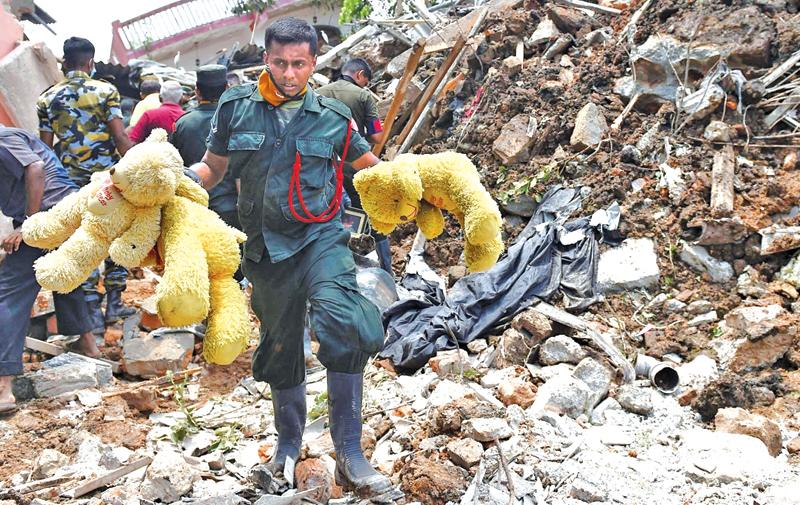
There is no viable short term solution to the garbage crisis which is a huge health hazard and an enormous cost to the country, according to waste management experts who attribute the problem to a lack of consistent and clear cut policies to find a permanent solution to the issue.
The experts said, the waste disposal issue has got out of hand due to the ad hoc measures adopted by successive governments that paid only lip service to the issue, and which has now turned into a gargantuan task for the entire country.
“ The issue could have been sorted out if the authorities had a clear vision. Waste management experts, with the support of the private sector would have helped solve the problem long ago,” a university don said.
He said, short term solutions will not help to achieve a perfect job. At present, garbage is disposed in open dumps which is not a proper and effective technique to address the issue. The dumping sites are constantly changed according to court rulings; it is not the proper method to address a national problem.
Senior Lecturer in Environmental Engineering , Department of Civil Engineering, University of Moratuwa, Dr. Mahesh Jayaweera said, there has to be a proper, scientific and long term solution backed by state-of-the-art technology to tackle the garbage issue.
Statistics reveal that around 150 million lunch sheets are disposed of per day during week days, and over 20 million shopping bags trashed daily in Sri Lanka. Around 500,000 MT of plastic and polythene are imported each year, of which around 70 percent is for domestic usage.
The total Municipal Solid Waste (MSW) generation is over 9,000 MT/Day according to statistics, of which around 3,242 MT is collected per day by the Municipality. The per capita waste generation is 0.51 kgs per day and the quantity that ends up in open dumps is 2,695 MT/Day. At present, there are over 260 open dumps in the country.
The garbage issue is most critical in the Western Province which disposes of over 1,340 MT/Day, while it is around the same amount from all other Provinces.
The final processing is carried out by the local authorities at 163 compost yards with a capacity of 5-20 MT/Day , 30 biogas units and 10 Sanitary Land Fills (SLF).
The government has come up with short and long term solutions to address the problem.
From a short term perspective, strict guidelines have been issued to the local authorities not to collect unsorted waste. The public has been urged to reduce waste generation, and to separate waste as degradable and non degradable to enable to create a better waste disposal system.
Many countries have got over the problem by adopting the three R system, such as Reduce, Re-use and Recycle which has paid off well and even turned out to be a lucrative venture.
The long term perspective measures include:
setting up SLF with a capacity of over 100MT/Day, integrated waste management facilities at Muthurajawella, composting plants with over 50MT/Day, rehabilitation of dump sites with capacities over 50,000 M3 (meter cubes) or 10,000 MT, and waste to energy projects with over 500 MT/Day.
Of the 10 SLF in the country only the Dompe landfill is functional .It is operated by the Central Environmental Authority (CEA). The CEA, with funding from KOICA (Korea International Cooperation Agency) plans to commence SLF in the Galle, Anuradhapura, Polonnaruwa and Jaffna districts. The CEA also hopes to commence SLFs in the Gampaha, Ratnapura and Moneragala districts. The Ministry of Mega polis and Western Development is to set up SLFs in Arruwakkalu, Puttalam to handle over 1,200 MT/Day. According to Dr. Jayaweera plans are in place to set up composting plants in the near future.
The Ministry of Agriculture will operate a compost plant of over 50MT/Day at Gohagoda Kandy, the Sri Lanka Land Reclamation and Development Corporation is to expand the composting plant at Meethotamulla up to 350 MT/Day and the Provincial Councils and Local Government Ministry is to set up Kawashima composting facility, each 50MT/Day in all Provinces.
At present, there are only one composting plant, which is in Digana. Plans are afoot to set up eight plants in all Provinces. Waste To Energy (WTE) plants of over 500MT/Day are also in the pipeline according to Dr. Jayaweera. Accordingly:
M/S Western Power Limited will commence a WTE plant to handle 600-800 MT/Day of CMC Municipal Solid Waste (MSW) to produce 10MW at Muthurajawela. M/S KCHT Jang Lanka (Pvt) Ltd. will set up a WTE plant to handle 630MT/Day at Gampaha to produce 10MW at Muthurajawela.
M/S Fairway Waste Management (Pvt) Ltd. is scheduled to commence a plant to handle 500MT/Day of Colombo South MSW to produce 10MW at Karadiyana. Dr. Jayaweera said completing work on waste to energy plants will take one to two years, composting one year and SLFs and waste to energy will require two years. Project operators have to comply with European Union (EU) standards on air pollution control.
He said, steps have been taken to stabilize and prevent any further collapse at the Meethotamulla dumping site.
